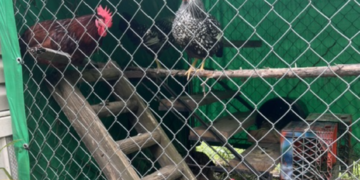While the world outside was coming to an end, Eli Bettiga was putting together his second album.
Eli, who performs and writes music under the name Brother Thomas, has been working on “Kudzu,” for over three years. Last March, he released “Oakseed,” the prequel or introductive version of the upcoming album. I wrote the preview for that album as well, and it was a cover story in the March 6 issue of The Daily Mississippian.
That was our last issue of spring 2020, and Eli’s face sat in newspaper vending machines for almost six months. Catching up with Eli felt familiar, but foreign; our interview was over Zoom instead of in person, and COVID-19 is now an instigator of a worldwide cultural shift instead of just a mysterious virus taking over China. We were still Eli and Eliza, but we were two very different versions of those people — almost like two strangers again.
“I actually recorded this album while I had COVID,” he said. “For 10 straight days, I would sleep until 11, and then work on music and drink Gatorade until I fell asleep. I did that for, like, 10 straight days — like nonstop. So, I worked on music because no one could see me; I couldn’t go anywhere. It was like eight hours a day.”
However, as quarantined time passed on, it became a time that Eli says is a blessing. Spending hours a day writing lyrics, composing tracks or mastering finished works, “Kudzu” became ready for the public, and it’s set to come out in April.
“I thank God I finally had time to just handle all of my responsibilities (and) to finally get a product out. For all of this stuff that I’ve been devoting all this time to behind the scenes, (I have) finally got it to a place I’m happy with,” he said.
During winter break, Eli and his roommates were exposed to COVID-19, forcing them into a two-week quarantine that cut very close to Christmas Day. Stuck in his room once again, he went over the lyrics of work that took months and years to put together and realized he hated them. His solution? Gutting them completely.
“It definitely made my lyric writing more interesting because I could tap into that. I think of us being restricted and forced in isolation. (The main character of the album is) very isolated to an extent — especially to the first half because he doesn’t even know where he is,” he said
To Eli, this version of the album is like the world has been since lockdown began: “less crowded.”
“I tend to use beats in the rhythm, and it makes it rushed,” he said. “It sounds like there’s a lot going on (and) sounds really crammed and anxious. Quarantine definitely broke it open with my psyche and lyric-writing, which was really, honestly, a revelation to me.”
“Kudzu” is the end of a long saga Eli and his friends have been building together for years. In this epic finale, he writes of Michael, a character he says is a parallel for himself. As Michael is transported to another universe to take on a mission granted by a deity he has never met, he faces trials and tribulations in a world he doesn’t understand. Where his last album had “purposefully vague” lyrics, those prophetic parables come to fruition.
Like the divine parallels he writes about for his character Michael, part of Eli’s story is coming to an end, as well. As a graduating senior, he will finish his studies in April and move on. To Eli, it’s an “unconscious cap” to this time in his life.

“It’s definitely like me creating this world where I can have him run through a bunch of turbulent things that I personally wanted to explore and see how I felt about or how I might handle them,” he said. “He’s set up in a world similar to something that I would personally face. Every site has symbolic structures that can represent what I face, so there’s little song details that are metaphorical for something in my own life.”
In the grand scheme of the COVID-19 pandemic, it has been a year of incalculable loss: loss of opportunity, of familiarity, of half a million people, of life as we knew it. For Eli, however, it’s been a year of gains. Besides “Kudzu,” he was accepted into medical school at the University of Mississippi Medical Center in Jackson, which he grew up 15 minutes away from in a suburb.
In an entire world of loss lasting 12 months, Eli is an underdog like his character Michael, who has to fight a Vader-esque character at the end of the album. It’s hard not to root for him.
“I think when I’m 50, I can still be Brother Thomas — write about work or something like that,” he said. “Brother Thomas at least gives me a sort of framework that I can do anything I want for forever.”



























